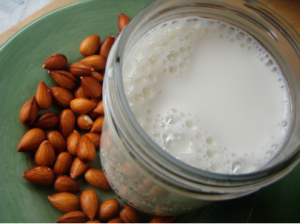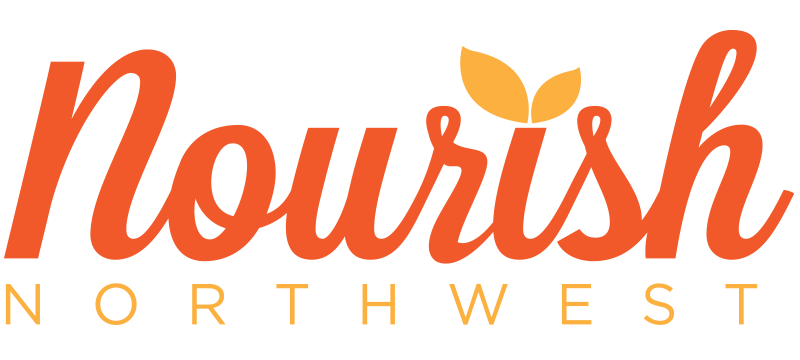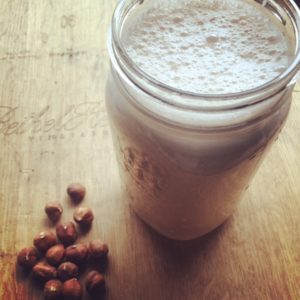Recipe: Homemade Nut Milk
Post by Sophia Worgan, Nutrition and Cooking Class Intern at Nourish Northwest
What’s hiding in your nut milk? Common milk additives: the friends and foes.
Within the last few years, a new awareness around food allergens and sensitivities has emerged. Many people have moved away from super pasteurized, homogenized cows milk and towards more plant based options like almond, soy and hemp (to name only a few) milks. Nut milks across the board have a whole host of natural benefits, high in monounsaturated fats, triglyceride lowering, high in both water and fat soluble vitamins and several minerals like calcium and magnesium. But this post isn’t about enlightening you all into the benefits of raw nuts- it is to talk about the not so savory additives added to commercially produced milks.
On a commercial level, emulsifying additives are necessary to keep milk solids suspended evenly throughout the beverage. When you make your own milks at home, often the solids will settle. To get around that sediment? A simple shake to reincorporate the water throughout the solution.
This week we dive into a brief overview of common nut milk additives, what they are and why you should learn more about them.
Carrageenan
Carrageenan has been popping up in many dairy products and vegan alternatives. It is an additive used to emulsify and thicken solutions and is derived from red seaweed- sounds harmless, right? Well not entirely. Carrageenan has been shown to cause inflammation in the gut and body as a whole. In small doses it isn’t harmful but repeated exposure can cause chronic inflammation within the body. Chronic inflammation is linked to a host of disorders within the body including Alzheimer’s and cancer among others. It is an important additive to be aware of for anyone dealing with any current inflammatory or gastrointestinal (GI) disorders.
Sunflower lecithin
Lecithin is a generic term designating a variety of naturally occurring fatty compounds found in animal and plant tissue. You might be more familiar with seeing soy and egg lecithin, though sunflower is often used as a soy-free, vegan option for nut milks. Isolated lecithin is composed of fatty acids, glyerol, triglycerides, and choline amongst other components. Though the majority of studies have been performed on soy lecithin, sunflower lechithin is also considered generally safe for consumption. Plant based lecithin have been used to treat disorders such as dementia, eczema, and gallstones to name a few!
Gellan gum
When beginning my research for this post, the ingredient I was most unfamiliar with was gellan gum. On my first Google search, I found this description, “gellan gum is a water-soluble polysaccharide produced by Pseudomonas elodea, a bacterium”. Oh… Totally. Now I get it… not. In typical additive fashion, gellan gum was swarthed in scientific words and jargon. What I eventually deduced is that gellan gum is used as a gelling agent used often in vegan products- in replacement of gelatin. It helps not only to gel a product, it also helps to disperse solids, suspended in liquids, equally.
Gellan gum hasn’t been shown to have any adverse health effects in clinical trials on humans. There have been some rat studies that showed some altered intestinal microvilli when exposed to gellan gum.
So what does this all mean?
Basically, all of the additives are considered safe in moderation. They have all been linked with GI inflammation in either rat or human studies, however. Chronic inflammation can cause issues down the road, so if you’re having commercially produced nut milks on a daily basis its food for thought. We recommend trying out making your own milk at home- you can control the ingredients, flavor and nut choice! Check out our basic nut milk recipe below- almond, hazelnut, or cashew are all great choices!
Basic Nut Milk Recipe
Adapted from wellnessmama.com

Ingredients:
1 cup of nuts (soaked overnight with 3 cups of filtered water and 1/2 tsp sea salt)
4 cups filtered water
**Optional additions:
You can add different ingredients to the basic recipe to give each milk a unique flavor. We love vanilla bean and cinnamon, cocoa powder and peanut butter, or maca and dates. Experiment with your favorite flavors!
Directions:
- Soak almonds overnight in filtered water with ½ tsp sea salt. This is an important step as it breaks down the phytic acid and enzyme inhibitors and cultures beneficial enzymes in the almonds.
- Rinse almonds well. Mix almonds with pure water in blender or Vitamix.
- Blend several minutes until smooth and creamy. (Warning: mixture will expand some, so make sure your blender is not full before starting it)
- Strain mixture into a large bowl through a sprout bag, cheese cloth or kitchen towel. Pour into glass jar or pitcher and store in fridge for up to one week.


